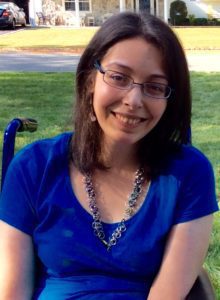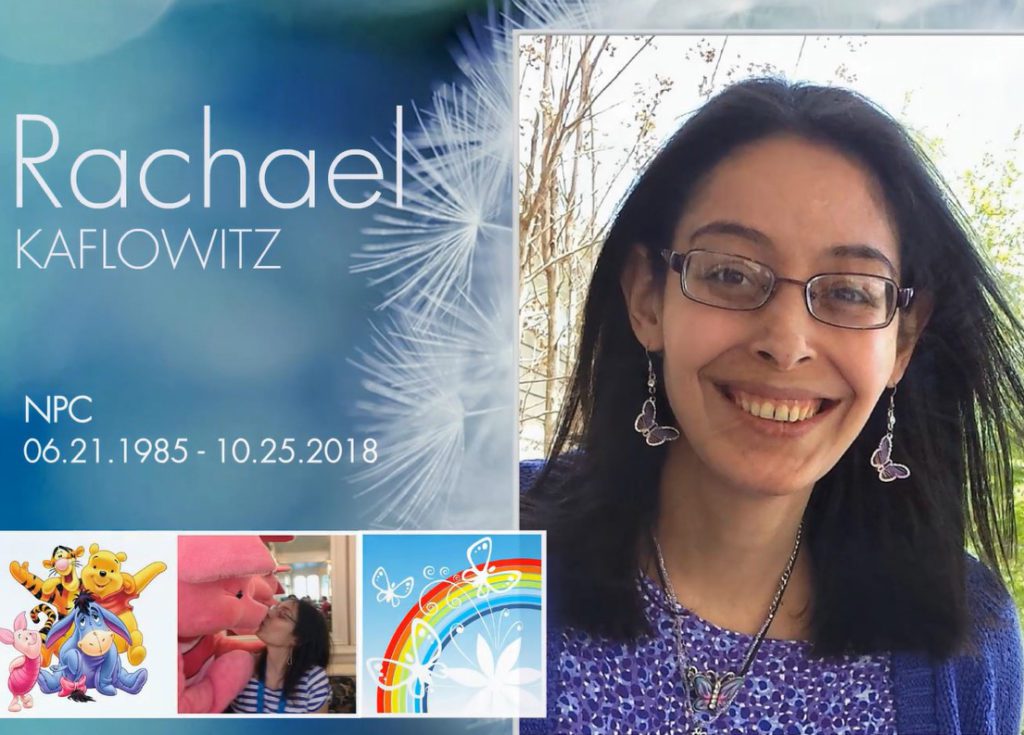In Part 1 of Rachael’s story, I spoke with her mother Debbie about what Niemann-Pick type C (NPC) is, the beginning of the diagnostic journey, and how Dr. Behar helped figure out the right diagnosis. Now, in today’s story, we discuss living with NPC after the diagnosis and how Debbie has found support in the NPC community.
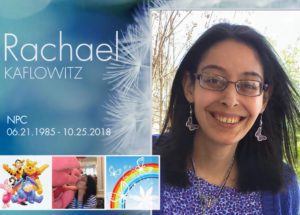
Living with NPC After the Diagnosis
Debbie, with the help of a case manager, began researching and enrolling Rachael in different groups and day programs because she was still social and loved being around people. At first, she did not like the programs because she didn’t see herself as disabled. However, as she continued to regress, she began making friends, especially with the teachers and the aides in the programs:
She loved going out and being involved in activities with other people. Let’s face it, what 25-year-old wants to stay home with her parents? By the time we could’ve gotten cyclodextrin, an experimental medication that slowed the progression in many patients, Rachael had lost a lot of her brain function. We knew it wasn’t going to make her walk or think. Plus it was delivered through a spinal tap every two weeks. So we focused on the day programs. If she was going to have limited time here, we wanted her to enjoy her time. She was happier.
Debbie and her husband also enlisted help from an aide through Care.com. This, she says, was somewhat difficult:
Rachael didn’t want a caretaker; she wanted a friend. Eventually we found two nice, young women who would come for a few hours on Saturday and Sunday. They would take Rachael out to lunch, do errands in New Providence, and then come home to make scrapbooks with Rachael. Rachael loved making scrapbooks from the pictures we had taken and decorating the pages with stickers and letters. Rachael made the design decisions and the aide acted as her hands. Unfortunately, as getting in and out of the car became dangerous and the foods Rachael could eat without choking became very limited, the aides could no longer take Rachael out.
We also had an artist from Arts Unbound, who came to the house to help Rachael create jewelry. Rachael had artistic control creating resin necklaces, with the aide doing the hands-on work, following Rachael’s directions. Some of the local stores sold Rachael’s jewelry. She was very proud of that and that’s what she needed.
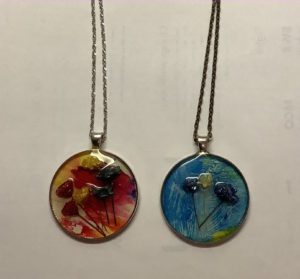
Rachael’s condition continued to decline bit by bit over the next seven years.
Debbie watched her daughter go from someone who loved to dance and play volleyball, to holding onto someone when she walked, to a walker and finally confined to a wheelchair. She went from someone who loved to make jewelry and sell it, to being unable to use her hands due to tremors.
Rachael went from baby-sitting, getting her driver’s license and having a part-time job to someone who couldn’t leave the house alone and finally needed help with every aspect of daily life. The list of foods Rachael could eat safely became smaller and smaller. Rachael’s cognitive ability continued to regress. However, every once in a while, she would ask a question like, “Who’s going to marry me? I’m not a person anymore.” What do you say to your child when she asks you that? While that thought was perceptive, Rachael still had difficulty wrapping her head around what was going on.
Finding Support
During this entire journey, it was sometimes hard to find support. Debbie does credit her sister Donna, as well as her cousin Andrea, for help. Debbie also explains that her husband, Steve, was the greatest partner and support throughout their journey. Yet being a 24/7 caregiver meant that:
Your circle of friends gets smaller and smaller. We couldn’t go anywhere because we couldn’t leave Rachael alone and couldn’t leave her with anyone else because her needs were too great. We didn’t have the energy to go out or make conversation with friends.
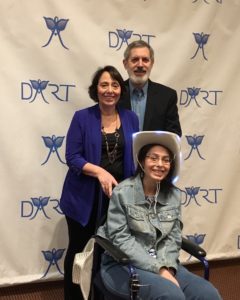
The doctor who diagnosed Rachael told Debbie about the National Niemann-Pick Disease Foundation (NNPDF). Debbie called them immediately and attended one of their conferences about 10 months after the diagnosis. There she found medical information, but most importantly other families who were dealing with the same challenges. Everyone was so supportive and welcoming. Debbie developed some very close friendships through the conferences and has continued to stay in touch with people throughout the years.
Debbie also started a private Facebook page to specifically address aging with Niemann-Pick type C. At her first conference, there had only been five people attending the adult-onset NPC session, and many of the other sessions centered around the experiences of childhood-onset NPC. For Debbie, this needed to change; there had to be a place that dealt with the specific challenges for parents with older children:
I wanted to connect with other families to talk about the issues parents have to deal with with older children. When children graduate from school, both the children and the families are on their own. There’s a big difference between what children have in school, such as occupational therapists, aides, and social workers as opposed to being out of school where nobody is finding you services or providing help.
At that point, you’re stuck with whatever your state has to offer, and for anything else, you need to search for it on your own. You also need to deal with finding finances to pay for any programs you find. A big challenge is that there is no classroom filled with peers for socialization. Your child loses friends little by little until nobody is left. They have all moved on with their lives. If your 16 year-old says, ‘I’m ugly,’ you have an answer. But there was no answer when Rachael said, ‘I had friends when I was a real person.’”
Within the Facebook group, Debbie and her fellow families address questions like, “How do I find appropriate company for my child?” and “My child gets scared when she sees blood. What do I do during her period?” Through this community, parents and families – including those who are newly diagnosed – are able to learn directly from those who have gone through the same struggles.
